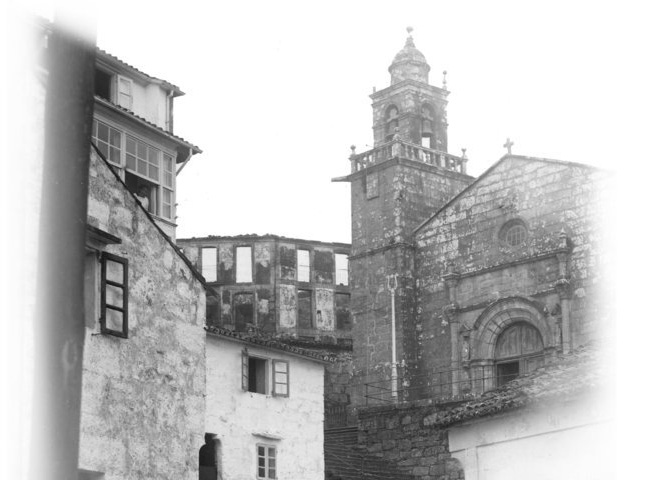
The church of Carril is consecrated to Santiago Apostle and it is not by chance, taking into account the old connection between the seafarer village and Compostela, since it was its port. The style of its archs and ribs in the Ánimas chapel is Ghotic, however, its general design is an example of Renaissace style.
Chronicles of that time evidence that in the early 17th century construction works had already started but the church was not finished up to 1666, when Juan de Sanclemente y Torquemada was Archbishop of Santiago. This temple has certain similitudes with the collegiate church of Cangas do Morrazo and with San Martín Pinario church in Santiago, both built by the Portuguese master Mateo López. His work team is thought to have designed Carril church as well. Its façade has two big ribbed columns ending in a pinnacle.
There are four stone figures between the columns and the main door: San Clement and a soul of the Purgatory, to the left; Saint Francisco and San Roque, to the right. Above the door there is a big rose window and above it, the figure of Santiago Apostle on horseback in relief.
But there are more connections with Compostela: the main altarpiece was brought from the Saint Domingo de Bonaval church, in Santiago. A work by the architect Domingo de Andrade, one of the main representatives of the Galician Baroque, arrived at Carril coinciding with the opening of the Santiago-Carril railway track, the first in Galicia.
Moreover, inside the temple there is a Holy table that was originally in the crypt of the Cathedral of Santiago de Compostela, and which contained, apparently, the remains of the Apostle. When the table was given to Carril that space underneath the tabernacle was filled with other relics, in this case, San Fidel’s. The martyr’s remains came from Italy and arrived at the village in 1817 thanks to the intermediation of someone from Carril. One year later, the Pope Pío VII granted the plenary indulgence and forgiveness of sins to those who visited the church of Carril with devotion. Since then, the Saint is venerated in the village and honoured in a very popular festival held in August.
The last element to highlight in the church of Carril is outside. It is a stone cross which is considered one of the best in Galicia, although nowadays the upper cross is missing due to an accident. It has a base with three steps on which the pedestal is set. This pedestal starts being square, and then it becomes a mould. This is the base that holds the shaft; square first, and then octagonal up to the end where there is a carved skull, and above it , the figures of Adam and Eve are looking downwards while the coiled serpent pesters the feminine figure.
Along the shaft there are some other elements related to the Passion, such as a crown of thorns, a whip, some nails and a hammer, and even a ladder. The cross, waiting for restoration, shows a crucified Christ on the front, and the Coronation of the Virgin, on the back.

Address: Extramuros, 11 Carril. 36613 – Vilagarcía de Arousa.
E-mail: jarios@archicompostela.org
Phone: 986 50 06 72